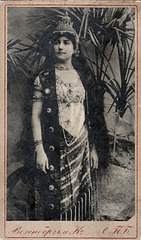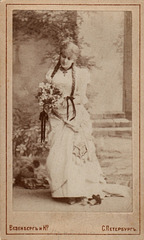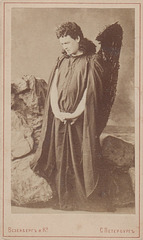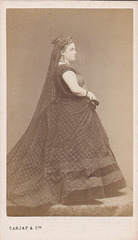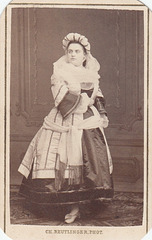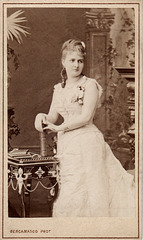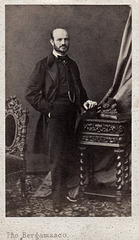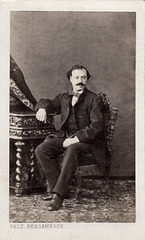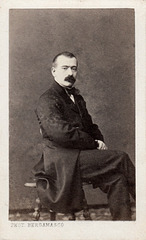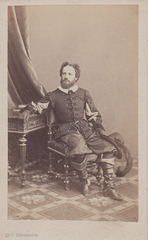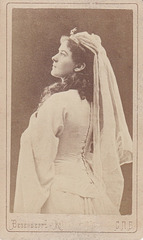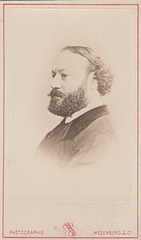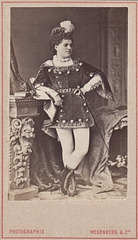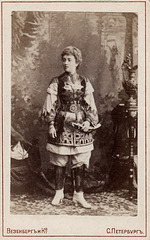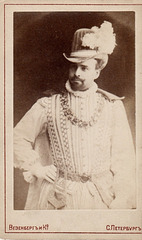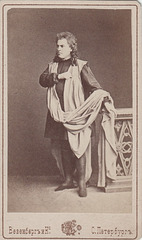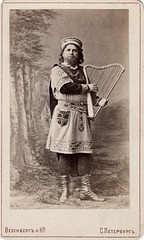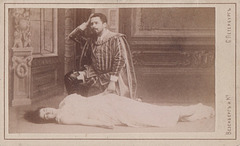Bialystok-Stavenuiter's photos
Sigrid Arnoldson by Wesenberg
| |
|
Sigrid Arnoldson (1861-1943); Swedish soprano.
She received her first vocal training from her father -the tenor Oscar Arnoldson- and from the Swedish baritone Fritz Arlberg. In 1882/83 she gave her first concerts in Sweden and Norway. She continued her studies in Paris with Moritz Strakosch, Mathilde Marchesi and Desirée Artôt. In 1885 she made her professional opera debut at Prague as Rosina in Rossini's "Il barbiere di Siviglia". With that same part of Rosina she made in 1886 her debut in Moscow at the Bolshoi Theatre and in 1887 in London at the Drury Lane Theatre. The critics described her as the "New Swedish Nightingale" and as the succcessor of the unforgotten Jenny Lind. In the following years she made guest appearances at Berlin, London, Paris (Opéra-Comique and Théâtre Lyrique), Denmark, Italy, Monte Carlo, St, Petersburg, Warsaw, Amsterdam, The Hague and Basel. In 1893/94 she debuted at the Metropolitan Opera in New York as Baucis in Gounod's "Philémon et Baucis". As a follow-up to her engagement at the Metropolitan, she undertook a major concert tour through the United States. In 1896/97 she made guest appearances at Bremen, Leipzig and Frankfurt am Main. The whole career of the artist was featured by worldwide tours, concerts and guest appearances. From 1912 on she worked as a vocal teacher; first at Vienna for 25 years and later at Stockholm. Her voice is preserved on several recordings made in Berlin between 1906 and 1910. There excists also a private recorded cylinder from the early days of sound recording (1889 !!).
For Rosina's aria "Una voce poco fa" sung by Sigrid Arnoldson go to: www.youtube.com/watch?v=linp02QM_7c
On the photo she is seen as Lakmé in the eponymous opera by Delibes.
Eugenia Mravina by Wesenberg
| |
|
Eugenia Mravina, born Maria Konstantinowa Mavrinskaya (1864-1914); Russian soprano.
Her singing teacher in St. Petersburg was the baritone Ippolit Petrovich Pryanishnikov and she also received a training as a ballet dancer. To complete her vocal studies she moved to Berlin, where she was a pupil of Désirée Artôt and to Paris, where she was educated by St. Yves Bax. In 1886 she made her debut at the Mariinsky Theatre in St. Petersburg as Gilda in Verdi's "Rigoletto". Until 1900 she belonged to the great and celebrated singers of this Opera House. Her most memorable roles were Antonida in Glinka's "A life for the Tsar", as Ludmilla in Glinka's "Ruslan and Ludmilla", as Tatjana in Tchaikovsky's "Eugen Onegin", as Marguerite in Gounod's "Faust", as Marguerite de Valois in Meyerbeer's "Les Huguenots", as Violetta in Verdi's "La Traviata", as Gilda in Verdi's "Rigoletto", as Elsa in Wagner's "Lohengrin" etc. Because she had received a professional training as a dancer, she also performed very successfully as prima ballerina at the Mariinsky. She made guest appearances in Moscow (Bolshoi) and other major Russian cities. In 1891 she appeared in London at Covent Garden. In 1894 at the Moscow Conservatory she created the role of Fornarina in Arenski's "Raphael". In 1895 at the Mariinsky she sang at the première of Rimsky-Korsakov's "Christmas Eve" the role of Oksana. She had a very attractive stage appearance and was an actress of high intelligence and dramatic intensity. Her voice was described as radiant in tone and technically excellent. She was one of those singer personalities who founded the great tradition of Russian opera.
On the photo she is seen as Marguerite in Gounod's "Faust".
Joakim Tartakov by Wesenberg
| |
|
Joakim Tartakov (1860-1923); Russian baritone.
He studied at the Conservatory of St. Petersburg with the baritone Camillo Everardi. His stage debut took place in 1882 with a Russian touring opera company. He then sang for two years at Russian provincial theaters, especially at the Odessa Opera House. In 1884 he was engaged at the Mariinsky Imperial Opera at St. Petersburg. From 1900 on he also worked as first stage director at the Mariinsky. In this position he remained -even after the October revolution of 1917- until his death in 1923. During his career he made guest appearances in Germany, England, France and Denmark. His most memorable roles were Rigoletto and Jago (Verdi), Eugen Onegin (Tschaikovsky) and The Demon (Rubinstein). In 1923 he died in a car accident.
On the photo he is seen as The Demon in Rubinstein's eponymous opera.
Marie Sasse by Carjat
| |
|
Marie Sasse (1834-1907); Belgian soprano.
In 1852 she made her debut in Venice as Gilda in Verdi’s “Rigoletto”. After an engagement at the Théâtre Lyrique she was engaged in 1860 by the Grand-Opéra Paris, where she was one of the leading sopranos for the next 17 years. Here she created the role of Elisabeth in the (Paris) premiere of Wagner's (revised) “Tannhäuser” (1861), the role of Sélika in the premiere of Meyerbeer's
“L'Africaine” (1865) and the role of Elisabeth de Valois in the premiere of Verdi's “Don Carlos” (1867). At the “La Scala” in Milan she created in 1870 the role of Cecilia in the opera “Il Guarany” by Gomes. She made guest appearances at St. Petersburg, Brussels, Cairo and Madrid. For a short period (1864/67) she was married to the famous bass singer Armand Castelmary (1834-1897). In 1877 she retired from the stage and worked as a singing teacher in Paris.She published her memoires in 1902 under the title “Souvenirs d’une artiste”. At the end of her life she lost her financial means and she died in poverty.
On the photo she is seen as Elisabeth de Valois in Verdi's “Don Carlos” ; the role she created at the world première on 11th March 1867 at the Paris Opera (Salle Le Peletier).
Marie Sasse by Reutlinger (2)
| |
|
Marie Sasse (1834-1907); Belgian soprano.
In 1852 she made her debut in Venice as Gilda in Verdi’s “Rigoletto”. After an engagement at the Théâtre Lyrique she was engaged in 1860 by the Grand-Opéra Paris, where she was one of the leading sopranos for the next 17 years. Here she created the role of Elisabeth in the (Paris) premiere of Wagner's (revised) “Tannhäuser” (1861), the role of Sélika in the premiere of Meyerbeer's
“L'Africaine” (1865) and the role of Elisabeth de Valois in the premiere of Verdi's “Don Carlos” (1867). At the “La Scala” in Milan she created in 1870 the role of Cecilia in the opera “Il Guarany” by Gomes. She made guest appearances at St. Petersburg, Brussels, Cairo and Madrid. For a short period (1864/67) she was married to the famous bass singer Armand Castelmary (1834-1897). In 1877 she retired from the stage and worked as a singing teacher in Paris.She published her memoires in 1902 under the title “Souvenirs d’une artiste”. At the end of her life she lost her financial means and she died in poverty.
Caroline Salla by Bergamasco
| |
|
Caroline Salla, born Caroline de Septavaux (1852-?); French soprano.
In 1874-1875 she had an engagement at the Monnaie Opera in Brussels, in 1876 at the Théâtre Gaîté in Paris and in 1877 she was engaged by the Mapleson Opera Company and performed e.g. in Dublin. In 1877 she created the role of Hélène in “Le timbre d’argent” by Saint-Saëns.
In 1878 she was heard at the Hofoper in Vienna and in 1882 she made her debut at the Grand Opera Paris creating the role of Francesca in the première of “Françoise de Rimini” by Ambroise Thomas. In 1886 she sang at the Opéra-Comique where in 1887 she created the role of Proserpine in the première of the eponymous opera by Saint-Saëns. Around the year 1890 she retired from the stage because of her marriage.
Enrico Calzolari by Bergamasco
| |
|
Enrico Calzolari (1823-1888); Italian tenor.
In 1846 he made his debut at La Scala in Milan as Lindoro in Rossini's "L'Italiana in Algeri". The next season he already made guest appearances at Vienna. He performed in Madrid (1847/48), Brussels (1848/49) and Paris (1850/52) at the Grand Opéra, where he also made a successful career. In 1856 he sang at Her Majesty's Theatre in London the role of Alfredo in the English première of Verdi's "La Traviata" with Marietta Piccolomini as Violetta. In the long period 1853/75 he appeared many times at the Court Opera of St. Petersburg; the audience of the Russian residence paid homage to the famous opera singer in an exuberant way. He did possess a lyric tenor voice and his most memorable roles were Elvino in "La Sonnambula", Tonio in "La fille du régiment", Nemorino in "L'Elisir d'amore", Almaviva in "Il barbiere di Siviglia", Don Ottavio in "Don Giovanni", Paolino in "Il matrimonio segreto", the title role in Rossini's "Otello" and Ramiro in "La Cenerentola".
Francesco Graziani by Bergamasco
| |
|
Francesco Graziani (1828-1901); Italian baritone who created the role of Don Carlo in Verdi's "La forza del destino" in St. Peterburg (1862). He was born into a musical family. Three of his brothers (tenor Lodovico 1820-1885, baritone Vincenzo 1836-1906 and bass Giuseppe 1819-1905) also became professional singers. His brother Lodovico was the first Alfredo in Verdi's La Traviata in1853. They all studied with Cellini and in 1851 Francesco made his debut in Ascoli Piceno as Conte di Vergy in Donizetti's "Gemma di Vergy". In the following years he performed in all the major opera houses in Italy including La Scala Milan. In 1854 he made a tour of guest appearances through the USA. In 1855 he made his Covent Garden debut in London as Don Carlo in Verdi's "Ernani". Until 1880 he returned to London almost every year and he performed in a number of English premières : in 1855 as Count di Luna in "Il Trovatore", in 1865 as Nelusco in "L'Africaine", in 1867 as Rodrigo in "Don Carlos" and in 1876 as Amonasro in "Aida". During the seasons 1853/61 he was also very successful in Paris at the Théâtre-Italien. In 1862 he created at St. Petersburg the role of Don Carlo in Verdi's "La forza del destino" with Enrico Tamberlick in the role of Don Alvaro. Graziani had one of the most beautiful baritone voices of his time, but from artistic point of view he appears not to have been very gifted. Critics of that time repeatedly referred to defects in his phrasing and they also doubted his musicality.
Gian Francesco Angelini by Bergamasco
| |
|
Gian Francesco Angelini (1830-1915); Italian bass who created the role of Padre Guardiano at the première of Verdi's "La forza del destino" in St. Petersburg (1862).
His first known public performance was in 1853 at the Teatro Corso in Bologna as Ferrando in Verdi's "Il Trovatore" (which premièred on 19 January 1853). In that same year he performed the role of Ferrando at the Teatro Floridi in Livorno and at the Teatro Regio in Turin. In 1854 he was engaged at the Teatro Carlo Felice in Genua. In 1855 he appeared at the Teatro Morlacchi in Perugia ( as Sparafucile) at the Teatro Apollo in Rome and he made guest appearances in Vienna at the Theater am Kärntnertor. In 1856 he was engaged in Paris at the Théâtre-Italien. In 1862 he created the role of Padre Guardiano at the première of Verdi's "La forza del destino" in St. Petersburg. In 1869 he created here the role of King Philippe in the Russian première of Verdi's "Don Carlos". After 1869 there are no facts known about his career.
Fyodor Komissartschevsky by Bergamasco (3)
| |
|
Fyodor Komissartschevsky (1832-1905); Russian tenor.
He studied law at the St. Petersburg University and then worked at the Russian Department of Taxation. After three years and against the wishes of his father, he gave up his career as a lawyer to study singing in Italy with Pietro Repetto. He then sang, under the name "Teodoro di Pietro", in Milan, Rome, Florence and Genoa, as well as in Odessa, Madrid, Barcelona, and even Rio de Janeiro. In 1863 he was engaged at the Mariinsky Theatre in St. Petersburg where he remained until 1880. Here he created Don Juan in Dargomyzhsky's "The Stone Guest" (1872), the Pretender in Mussorgsky's "Boris Godunov" (1874), Prince Sinodal in Rubinstein's "The Demon" (1875) and the title role in Tchaikovsky's "Vakula the Smith" (1876). In 1880 he moved to Moscow where he was engaged by the Bolshoi Theatre. Here he performed as a singer and as a stage director as well. In 1883 he retired from the stage and the following 5 years he was he was a professor of singing and acting at the Moscow Conservatory. In 1905 he died in Rome and was buried in the Protestant Cemetery.
The inscription on his gravestone reads: "Teodoro Komisarjevsky di Pietro, artist of the Italian opera and the Imperial Opera of St. Petersburg, professor at the Moscow Conservatory and a soldier in Garibaldi's legions, died on the soil of his beloved Italy."
Wilhelmina Raab by Wesenberg (2)
| |
|
Wilhelmina Raab, born Wilhelmina Bilik (1848-1917); Czech soprano.
She studied singing at the Conservatory of St. Petersburg with Henriette Nissen-Saloman, as well as at the Conservatory of Vienna with Falconi. In 1871 she made her debut at the Imperial Opera in St. Petersburg as Mathilde in Rossini's "William Tell". Here she remained until 1884. During this period she sang at various important world premières of Russian operas. In 1874 she created Natalya in Tchaikovsky's "Oprichnik", in 1875 Tamara in Rubinstein's "The Demon" and in1876 Oksana in "Vakula the smith" also by Tchaikovsky. In 1877 she sang at the Russian première of Rubinstein's "The Maccabees" the role of Noëmi. In 1880 she created the role of Alyona Dmitriyevna in Rubinstein's "The merchant Kalashnikov" and in 1881 Agnès Sorel in Tchaikovsky's "The maid of Orleans". She had a virtually unlimited creative power, what enabled her to perform multiple roles in the same Opera: Gorislava and Lyudmila in Glinka's "Ruslan and Ludmilla", Kupava and the title character in "Snegourotchka/The Snow Maiden" by Rimsky-Korsakov, Queen Marguerite and the page Urbain in Meyerbeer's "Les Huguenots" and Donna Anna and Donna Elvira in Mozart's "Don Giovanni". Among her most memorable roles were Marguerite in "Faust", Gilda in "Rigoletto", Elsa in Lohengrin and Aida. After she retired from the stage she worked at the Conservatory of St. Petersburg as a vocal teacher.
On the photo she is seen as Elsa in Wagner's "Lohengrin".
Lodovico Graziani by Wesenberg
| |
|
|
Lodovico Graziani (1820-1885); Italian tenor who created the role of Alfredo in Verdi's "La Traviata" at the Teatro La Fenice in Venice on 6 March1853. He was born into a musical family. Three of his brothers (baritone Francesco 1828-1901, baritone Vincenzo 1836-1906 and bass Giuseppe 1819-1905) also became professional singers. He studied with Cellini and made his debut in 1845 in Bologna in Cambiaggio's "Don Procopio". In 1846 he was heard at the Regio Teatro degli Avvalorati in Livorno as Elvino in Bellini's "La sonnambula". In 1847 he made his debut at La Scala Milan in the title role of Donizetti's "Dom Sébastien". In 1851 he sang in Paris at the Théâtre-Italien and in 1852 he was engaged in Venice at the Teatro La Fenice. Here he created the role of Alfredo at the première of Verdi's "La Traviata" in 1853. For the season 1854/55 he returned to Paris to sing again for the Théâtre-Italien. In 1855 Graziani returned to La Scala in Milan. He sang the role of Vasco da Gama in the first Italian performance of Meyerbeer's "L'Africaine" in Bologna in 1865.
Sofia Scalchi by Wesenberg
| |
|
Sofia Scalchi (1850-1922); Italian contralto/mezzo-soprano.
She received her vocal training from Augusta Boccabadati. In 1866 she made her debut in Mantua as Ulrica in Verdi's "Un ballo in maschera". In the following years she appeared in the Italian Opera theatres of Verona, Bologna, Faenza, Nizza and Brescia. In 1868 she made her London debut at Covent Garden as Azucena in Verdi's "Il Trovatore". In the following years -until 1890- she appeared at Covent Garden, performing roles like Urbain, Amneris and Arsace. In 1882/83 she toured the U.S.A. for the first time, singing with the Mapleson Company. In 1883 she sang at the inauguration of the newly constructed Metropolitan Opera New York the role of Siébel in Gounod's "Faust". In 1884 she returned to Mapleson's Opera Company. In 1891 she was again engaged at the Metropolitan. After leaving the Metropolitan in 1896 she formed her own opera company and undertook a final American tour. She sang at several important American premieres: Verdi's "Otello" and "Falstaff", Ponchielli's" La Gioconda" and Giordano's "Andrea Chénier". During her career she made guest appearances in Moscow, St. Petersburg, Vienna, Monte Carlo and North and South America. In 1896 she retired from the stage.
Maria Dolina by Wesenberg
| |
|
Maria Dolina, born Maria Ivanovna Sajuschkina Gorlenko (1868-1919); Russian contralto.
Her voice was discovered by Garcia-Wilde and trained mainly by Kondratiev. Final studies were carried out with Carelli in Naples, with Mastriani in Milan and finally in Paris. In 1886 she made her debut at the Marienskij Theatre in St. Petersburg as Vanya in Glinka's "A life for the Tsar" (Ivan Susanin). She was engaged immediately and remained at the Mariiinsky until 1904. Here in 1890 she sang at the premiere of Borodin's "Prince Igor" under the direction of Edouard Naprawnik. Also in 1890 she created the role of Polina at the premiere of Tchaikovsky's "Pique Dame/Queen of spades" and from the same composer in 1892 the role of Laura in "Iolanta". In 1896 she sang at the Mariinsky the role of Hansel in the Russian premiere of Humperdinck 's "Hansel and Gretel". She made guest appearances in Moscow and other Russian theaters and abroad in Paris, Berlin, Vienna, Budapest, Constantinopel, Sofia, Belgrad, Zagreb, Dresden and Rouen. Her repertoire consisted of more than 50 roles, mostly in the field of Russian and French Opera. As a concert singer she was very successfully in a vast repertoire.
Leonid Yakovlev by Wesenberg
| |
|
Leonid Yakovlev (1857-1919); Russian baritone.
His voice was discovered by Riadnow in Kiev who gave him his vocal training. His first engagement was in Tiflis, where during the first two months he sang 8 different roles in 21 performances. Here he was heard by Tchaikovsky who recommended him to the director of the Mariinsky Theatre in St. Petersburg. Here he debuted in 1887 as Valentin in Gounod's "Faust" and very soon he became one of the most prominent singers of this company. His star role was the title character in Tchaikovsky's "Eugen Onegin", which he has sung 115 times in the course of his career. In 1890 he created the role of Prince Yeletsky in Tchaikovsky's "The Queen of Spades" and in 1892 the role of Robert in "Iolanta" by the same composer. He was immensely popular at the Mariinsky, both as a singer and an actor until vocal problems forced his retirement from the stage. In 1905 –after a severe cold- he lost his voice. Even after a one-year stay on the Riviera his voice did not return. In 1912 his friends tried -with little success- to help the very impoverished artist by organizing a celebration for his 25-year stage anniversary. In 1918 he was offered the position of a stage director at the Mariinsky, but he died a few months later.
On the photo he is seen as Le Comte de Nevers in Meyerbeer's "Les Huguenots".
Ivan Melnikov by Wesenberg (2)
| |
|
Ivan Melnikov (1831-1906); Russian baritone.
He studied singing at the Conservatory of St. Petersburg with Gavriil Lomakin and in Milan with Repetto. He started his career at the Opera of Kiev (1865/67). In 1867 he made his debut at the Imperial Opera in St. Petersburg as Riccardo in Bellini's "I Puritani". The first two years he only performed in Italian operas. Then he turned his interest to the independent Russian Opera, whose roles he sang from now on. Until 1890 he was a highly respected member of this leading Russian Opera house. He performed in St. Petersburg in a number of musically and historically important world premieres of Russian operas. In 1872 he created the role of Don Carlos in the premiere of Dargomyshski's "The stone guest" and in 1873 Prince Tokmakov in Rimsky-Korsakov's "The Maid of Pskov". In 1874 he sang the title role in the first complete performance of Mussorgsky 's "Boris Godunow". In 1875 he created the title role in Rubinstein's "The Demon" and in 1890 Igor in Borodin's "Prince Igor". He also created roles in four of Tchaikovsky's operas: Prince Vyazminsky in "Oprichnik" (1874), a devil from hell in "Vakula the Smith" (1876), Prince Kurlyatev in "The Enchantress" (1887) and Count Tomsky in "The Queen of Spades" (1890). In 1890 the highly respected artist ended his career with a performance of Prince Igor. During the years 1890/92 he was general director of the Mariinsky Theatre. In 1897 he undertook a last farewell tour. In 1906 he published his autobiography.
On the photo he is seen as The Demon in Rubinstein's eponymous opera.
Ivan Melnikov by Wesenberg (1)
| |
|
Ivan Melnikov (1831-1906); Russian baritone.
He studied singing at the Conservatory of St. Petersburg with Gavriil Lomakin and in Milan with Repetto. He started his career at the Opera of Kiev (1865/67). In 1867 he made his debut at the Imperial Opera in St. Petersburg as Riccardo in Bellini's "I Puritani". The first two years he only performed in Italian operas. Then he turned his interest to the independent Russian Opera, whose roles he sang from now on. Until 1890 he was a highly respected member of this leading Russian Opera house. He performed in St. Petersburg in a number of musically and historically important world premieres of Russian operas. In 1872 he created the role of Don Carlos in the premiere of Dargomyshski's "The stone guest" and in 1873 Prince Tokmakov in Rimsky-Korsakov's "The Maid of Pskov". In 1874 he sang the title role in the first complete performance of Mussorgsky 's "Boris Godunow". In 1875 he created the title role in Rubinstein's "The Demon" and in 1890 Igor in Borodin's "Prince Igor". He also created roles in four of Tchaikovsky's operas: Prince Vyazminsky in "Oprichnik" (1874), a devil from hell in "Vakula the Smith" (1876), Prince Kurlyatev in "The Enchantress" (1887) and Count Tomsky in "The Queen of Spades" (1890). In 1890 the highly respected artist ended his career with a performance of Prince Igor. During the years 1890/92 he was general director of the Mariinsky Theatre. In 1897 he undertook a last farewell tour. In 1906 he published his autobiography.
On the photo he is seen as Wolfram in Wagner's "Tannhhäuser".
Nikolai Figner and Medea Mei-Figner by Wesenberg (…
| |
|
|
Nikolai Figner (1857-1918); Russian tenor.
He studied singing in St. Petersburg with Ippolit Pryanishnikov and Camillo Everardi and in Naples with De Roxas. Here in Naples in 1882 he made his debut at the Teatro Sannazaro in Gounod's opera "Philémon et Baucis". In the following years he sang at the opera houses of Parma and Bologna and made international guest appearances at London, Madrid, Bukarest and St. Petersburg.. At the opera of Parma he performed in Aida and La Gioconda together with his future wife Medea Mei (they got married in 1889). In 1887-1904 and in 1907 he was engaged at the Mariinsky Theatre in St. Petersburg. In 1887 he sang the title role in the Russian premiere of Verdi 's "Otello" and since 1889 he celebrated here many triumphs together with his wife. The singer couple had a large influence on Russian musical life of their epoch. The with them befriended composer Tchaikovsky completed on their country estate in the vicinity of Tula his opera "Pique Dame", which he dedicated to the two artists. In the premiere in St. Petersburg (1890) Nikolai Figner sang the the role of Hermann and Medea Mei-Figner the role of Liza. In 1892 they performed in another Tchaikovsky première; Mei-Figner created the title role of Iolanta and Figner the role of Count Vaudémont. In 1903 the singer couple divorced. In the years 1907/10 he sang at various private opera companies in Russia. During the period 1910/15 he was director of the Narodny Dom Theatre at St. Petersburg. In the turmoil of the Russian revolution of 1917 the once idolized artist completely impoverished.
Medea Mei-Figner, born Amedea Mei Zovaide (1859-1952); Italian soprano/contralto.
She was born in Florence and studied with Bianchi, Carozzi-Zucchi and Panofka. In 1874 she made her debut at Sinaluga as Azucena in Verdi's "Il Trovatore". During the following nine years she appeared in various Italian theatres. She made guest appearances in Madrid, Barcelona, London, Bukarest, Russia and South America. At that time her repertory included Amneris, Ulrica, Leonora (in La Favorita) and Carmen. Step by step she began to shift into the soprano repertory. She sang Valentine in Les Huguenots, Charlotte in Werther and Margherita in Mefistofele. During her appearances in Milan she met her future husband, the Russian tenor Nicolai Figner (1857-1918). She married him in 1889. They both joined the Imperial Opera in St. Petersburg, where they had very succesfull careers. The singer couple had a large influence on Russian musical life of their epoch. The with them befriended composer Tchaikovsky completed on their country estate in the vicinity of Tula his opera "Pique Dame/Queen of Spades", which he dedicated to the two artists. In the premiere in St. Petersburg (1890) Nikolai Figner sang the the role of Hermann and Medea Mei-Figner the role of Liza. They also created leading roles in the première of Tchaikovsky’s "Iolanta" (1892); Nicolai as Count Vaudémont and Medea as Iolanta. They sang at the première of 2 operas by the Czech composer and Mariinsky conductor Edouard Nápravnik: "Dubrovsky" in 1895 and "Francesca da Rimini" in 1902. She spent her life in Russia but remained an Italian trained singer. She appeared mostly in Italian and French operas. The couple was much loved by the Tsar’s family and they were guests at all the elegant drawing-rooms of Imperial Russia. In 1903 the singer couple divorced. In 1904 she made a last operatic tour in South America and continued her career at the Mariinsky Theatre in St. Petersburg until her farewell performance as Carmen in 1912. She finally left Russia in 1930 and settled in Paris where she died in 1952.
On the photo he is seen as Raoul and she as Valentine in Meyerbeer's "Les Huguenots".
Jump to top
- ipernity © 2007-2024
- Help & Contact
|
Club news
|
About ipernity
|
History |
ipernity Club & Prices |
Guide of good conduct
Donate | Group guidelines | Privacy policy | Terms of use | Statutes | In memoria -
Facebook
Twitter

